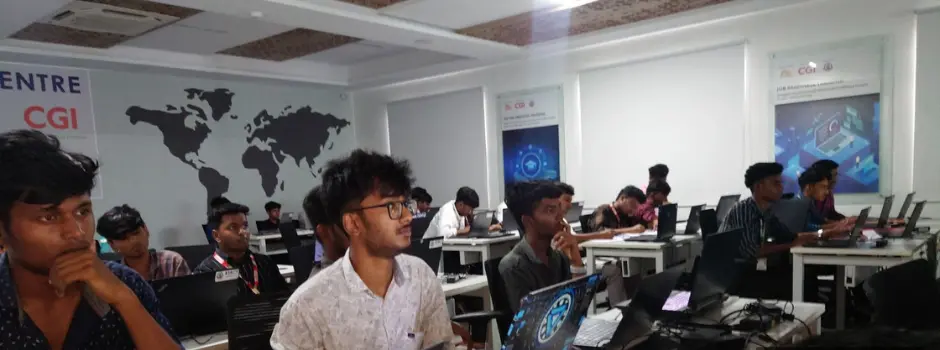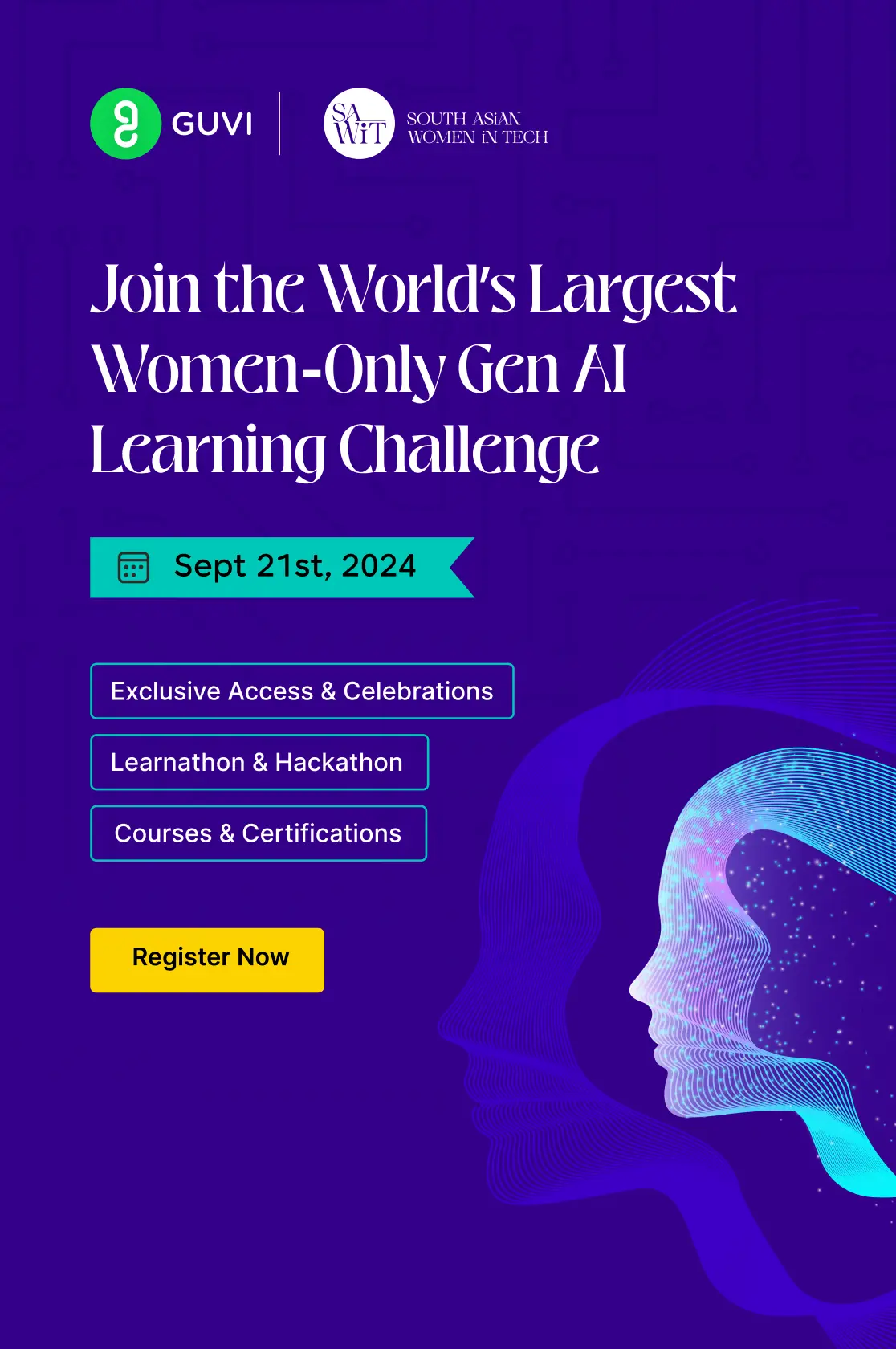
GUVI at K.S. Rangasamy College: Nurturing Next-Gen Data Science and Machine Learning Talent
Oct 30, 2024 4 Min Read 32 Views
(Last Updated)
GUVI recently conducted training sessions at K.S. Rangasamy College of Technology in Namakkal, Tamil Nadu. The goal was to provide students with knowledge nuggets on data science and machine learning. This initiative was integral to GUVI’s mission of empowering students by bridging the gap between academic theory and industry demands.
From Sep 19 to Sep 23, 2024, the sessions provided a hands-on learning experience, allowing participants to plunge into important data science and machine learning tools and methodologies. By focusing on applied learning, GUVI successfully helped students develop a foundation in these trending fields while motivating them to explore more about them.
Table of contents
- Session highlights: From the six pillars of machine learning to classification models
- Key highlights of the training sessions included:
- Student feedback: A highly beneficial experience
- Exploring GUVI's data science and machine learning courses
- 1) GUVI's Data Science Course with IIT-M certification
- 2) GUVI's Artificial Intelligence and Machine Learning course with IIT-M certification
- Industry Trends and Career Opportunities in Data Science and Machine Learning
- Wrapping Up
- Frequently Asked Questions
- How do I choose the right data science project to work on as a beginner?
- Can someone from a non-technical background learn data science and machine learning?
- Are data science and machine learning only for big tech companies?
- How is machine learning different from regular programming?
Session highlights: From the six pillars of machine learning to classification models
During the five-day training at K.S. Rangasamy College, GUVI facilitated a rich curriculum that covered vital aspects of data science and machine learning. The sessions included a variety of topics that engaged students throughout.
Key highlights of the training sessions included:
1. The foundation of data science: Students got the lowdown on data science and understood the fundamentals.
2. The pillars of machine learning: They dug into the six core concepts of machine learning.
3. Data manipulation: Students learned how Python and Pandas make data analysis easier.
4. Regression analysis: They dived into linear and non-linear regression models, including data preprocessing, model building, and evaluation metrics.
5. Classification essentials: Students were introduced to the key metrics, models, and parameters for classification, with hands-on experience in results comparison and hyperparameter tuning.
6. Practical model building: They built and evaluated regression and classification models, testing their skills through interactive exercises.
Student feedback: A highly beneficial experience
The response from students following the training sessions was overwhelmingly positive. Many expressed appreciation for the engaging format and practical relevance of the content. Ratings highlighted a strong sense of satisfaction, with overall training experiences receiving a score of 4.6 out of 5.
Participants shared that the sessions helped them simplify complex data science and machine learning concepts. Their feedback reflected a consensus that the hands-on approach was particularly beneficial, allowing them to apply what they learned in real-world scenarios.
Students also documented that the interactive nature of the sessions encouraged collaboration and learning among peers. They appreciated the ability to work directly with industry-relevant tools and methodologies, feeling confident about pursuing careers in these fields.
Exploring GUVI’s data science and machine learning courses
Adding to what they learned from the training sessions, the participants explored GUVI’s data science and machine learning courses, along with self-paced options in Python.
GUVI’s data science and machine learning courses, which remain one of the best in India, excited the learners as they learned about them in detail:
1) GUVI’s Data Science Course with IIT-M certification
GUVI’s IITM-Pravartak Certified Advanced Programmer with Data Science Mastery Program is 3-month weekday or 5-month weekend live course that dives into:
– Data analysis
– Statistical modeling
– Data visualization
The top benefits of this program include:
– Hands-on projects: Learn from real-world challenges, applying theory to practice.
– Program available in three languages: You can access the course in either English, Hindi or தமிழ்
– Expert guidance: Get training from industry veterans from leading industries.
– Essential tools: Master Python, Pandas, NumPy, and Tableau, among many other tools to master data challenges.
Learn More: Course Link
2) GUVI’s Artificial Intelligence and Machine Learning course with IIT-M certification
GUVI’s IIT-M Pravartak Certified Artificial Intelligence and Machine Learning program makes you an expert in just five months, while also making you familiar with the field of artificial intelligence. This course, which runs with both live and recorded sessions, is ideal for professionals, as well as graduates looking to upskill.
The key elements covered in this program include:
– Foundational algorithms
– Advanced techniques
– Supervised learning
– Deep learning
– Natural language processing
The major ways in which you benefit include:
– Real-world projects: Apply your new-found skills through hands-on workshops and hackathons.
– Program available in English & தமிழ்: At GUVI, we’ve always vouched for tech education in one’s native language for a smooth learning experience.
– Expert network: Get a chance to connect with top tech companies (1000+ hiring partners) for opportunities.
– Future-proof skills: Master machine learning and artificial intelligence models, and boost your portfolio.
Learn More: Course Link
Before diving into the next section, ensure you’re solid on Python essentials from basics to advanced level. Learning Python can help you grasp data science and machine learning fundamentals quite smoothly. If you are looking for a detailed Python career program, you can join GUVI’s Zen Value Added Mentorship Python Programming with placement assistance. You will be able to master the Multiple Exceptions, classes, OOPS concepts, dictionary, and many more, and build real-life projects.
Also, if you’d like to explore Python, try our Python Course. This self-paced course is an excellent starting point for a step into data science and machine learning. The course covers:
– Python programming basics
– Data structures
– Essential libraries: Pandas, Matplotlib
The primary benefits include:
– 7+ hours of video lessons: Comprehensive and concise
– Practice made fun: Gamified exercises and challenges
– Global recognition: GUVI’s certification boosts your profile
These courses have enabled many students to build successful careers in data science and machine learning. If you’re also eager to have a career in these fields, then join GUVI today!
Industry Trends and Career Opportunities in Data Science and Machine Learning
Before you begin to map out your career journey in data science and machine learning, it’s important to be aware of the current industry needs, growth, and opportunities.
The demand for data science and machine learning professionals has, over the years, seen a continuous rise. Data science jobs are expected to grow by 27.9% through 2026, making it one of the fastest-growing fields. Similarly, the Fortune Business Insights report mentions that the global machine learning market is expected to grow from $4.74 billion in 2022 to $59.3 billion by 2030, with a CAGR of 37.2%.
Emerging trends, such as the integration of AI in business operations, the rise of automated machine learning (AutoML), and the increasing focus on ethical AI practices, are opening up new career opportunities for data science and machine learning experts. Moreover, specific skills like natural language processing (NLP) and deep learning have also seen increased demand.
Getting yourself trained in these domains is surely going to boost your career prospects while making you proficient for roles like Data Scientist, Machine Learning Engineer, AI Specialist, and Business Intelligence Analyst. By building a strong foundation now, you can tap into these growing fields and shape the future of tech.
Wrapping Up
As discussed in this article, the training sessions at K.S. Rangasamy College gave students a fair glimpse of the hands-on skills one needs to have in order to advance their career in data science and machine learning. Through practical training, they can bridge the gap between theoretical knowledge and real-world application.
With the growing demand for experts in these fields, now is the perfect time to lay your hands deep and build a career in this exciting space. If you’d like to explore some significant data science concepts or get yourself familiar with machine learning tools then enroll in GUVI’s comprehensive courses. These courses, backed by industry-recognized certifications and a rich learning experience, are your gateway to success!
Frequently Asked Questions
How do I choose the right data science project to work on as a beginner?
When starting out, choose projects that solve real-world problems and are relevant to the industry you’re interested in. For example, beginners can explore projects like movie recommendation systems, sentiment analysis of tweets, or sales forecasting. These projects cover basic machine learning algorithms, data manipulation, and visualization, which are essential skills in data science.
Can someone from a non-technical background learn data science and machine learning?
Absolutely! Data science and machine learning are accessible to people from all backgrounds. Many online courses and certifications start with the basics and don’t assume prior knowledge of coding or math. With dedication and consistent practice, even those without a technical background can become proficient
Are data science and machine learning only for big tech companies?
Not at all! While tech giants like Google and Amazon are known for their use of machine learning, many small and medium-sized businesses are adopting these technologies to improve processes, customer experience, and decision-making in industries like healthcare, agriculture, and finance.
How is machine learning different from regular programming?
In traditional programming, developers write explicit instructions for the computer to follow. In machine learning, the computer learns from data and finds patterns to make decisions or predictions without being explicitly programmed for each task.






















Did you enjoy this article?